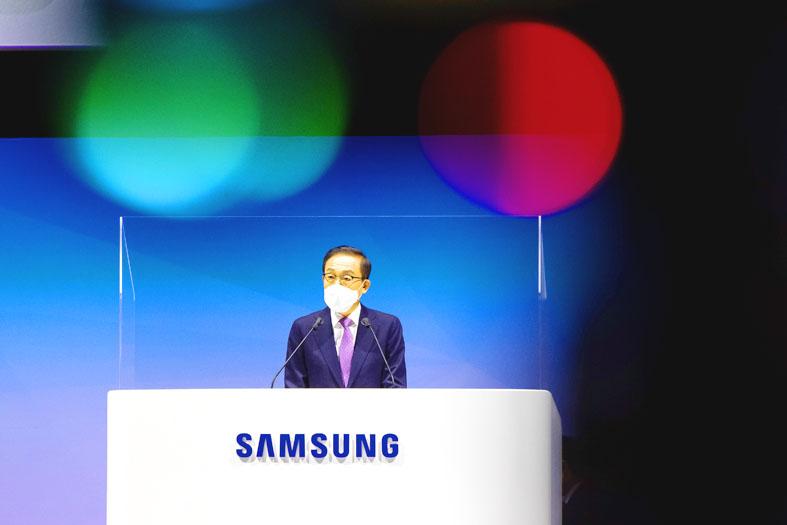Samsung Electronics Co yesterday said that it is grappling with the fallout from a “serious imbalance” in semiconductors globally, becoming the largest tech giant to voice concerns about chip shortages spreading beyond the automaking industry.
The company, one of the world’s largest makers of chips and consumer electronics, expects the crunch to pose a problem to its business next quarter, Samsung cochief executive officer Koh Dong-jin told an annual shareholders’ meeting in Seoul.
Samsung is also considering skipping the introduction of a new Galaxy Note — one of its best-selling models — this year, although Koh said that was geared toward streamlining its lineup.

Photo: Bloomberg
Industry giants from Continental AG to Renesas Electronics Corp and Innolux Corp (群創) have in the past few weeks warned of longer-than-anticipated deficits thanks to COVID-19-era demand for everything from vehicles to game consoles and mobile devices.
Samsung, the world’s largest smartphone maker, is working with overseas partners to resolve the imbalance and avert potential setbacks to its business, Koh said.
Samsung’s Note series contributed to an estimated 5 percent of the company’s smartphone shipments over the past two years, but accounts for a more significant chunk of revenue because it is one of the priciest in the lineup, International Data Corp said.
“If Samsung is publicly talking about future products, you know that the silicon crunch is serious,” said Avi Greengart, analyst and founder of consultancy Techsponential.
Chipmakers such as Samsung and Taiwan Semiconductor Manufacturing Co (台積電) are at the forefront of a global effort to plug a shortfall in supply of chips, the building blocks of a plethora of consumer gadgets. The deficit has closed auto plants around the world, and now threatens supply of other products.
Compounding the demand surge, Samsung’s semiconductor fab in Austin, Texas, was sidelined last month by statewide power outages and has not resumed full production.
The resulting shortfall in production of Qualcomm Inc’s 5G radio frequency chips could reduce global smartphone output by 5 percent in the second quarter, research firm Trendforce Corp (集邦科技) said.
The outages are likely to affect Samsung’s mid-tier phones and laptops more than its top-of-the-range models or server chips, said Greg Roh, a senior vice president at HMC Securities & Investment.
“There’s a serious imbalance in supply and demand of chips in the IT sector globally,” said Koh, who oversees the company’s IT and mobile divisions.
“Despite the difficult environment, our business leaders are meeting partners overseas to solve these problems. It’s hard to say the shortage issue has been solved 100 percent,” he said.
Samsung might decide not to introduce its Galaxy Note during the second half of this year, breaking a years-long streak of annual launches for the marquee line, Koh said.
“Note series is positioned as a high-end model in our business portfolio,” Koh said. “It could be a burden to unveil two flagship models in a year so it might be difficult to release Note model in the second half. The timing of Note model launch can be changed, but we seek to release a Note model next year.”

Taiwanese suppliers to Taiwan Semiconductor Manufacturing Co. (TSMC, 台積電) are expected to follow the contract chipmaker’s step to invest in the US, but their relocation may be seven to eight years away, Minister of Economic Affairs J.W. Kuo (郭智輝) said yesterday. When asked by opposition Chinese Nationalist Party (KMT) Legislator Niu Hsu-ting (牛煦庭) in the legislature about growing concerns that TSMC’s huge investments in the US will prompt its suppliers to follow suit, Kuo said based on the chipmaker’s current limited production volume, it is unlikely to lead its supply chain to go there for now. “Unless TSMC completes its planned six

Intel Corp has named Tasha Chuang (莊蓓瑜) to lead Intel Taiwan in a bid to reinforce relations between the company and its Taiwanese partners. The appointment of Chuang as general manager for Intel Taiwan takes effect on Thursday, the firm said in a statement yesterday. Chuang is to lead her team in Taiwan to pursue product development and sales growth in an effort to reinforce the company’s ties with its partners and clients, Intel said. Chuang was previously in charge of managing Intel’s ties with leading Taiwanese PC brand Asustek Computer Inc (華碩), which included helping Asustek strengthen its global businesses, the company

Power supply and electronic components maker Delta Electronics Inc (台達電) yesterday said second-quarter revenue is expected to surpass the first quarter, which rose 30 percent year-on-year to NT$118.92 billion (US$3.71 billion). Revenue this quarter is likely to grow, as US clients have front-loaded orders ahead of US President Donald Trump’s planned tariffs on Taiwanese goods, Delta chairman Ping Cheng (鄭平) said at an earnings conference in Taipei, referring to the 90-day pause in tariff implementation Trump announced on April 9. While situations in the third and fourth quarters remain unclear, “We will not halt our long-term deployments and do not plan to

The New Taiwan dollar and Taiwanese stocks surged on signs that trade tensions between the world’s top two economies might start easing and as US tech earnings boosted the outlook of the nation’s semiconductor exports. The NT dollar strengthened as much as 3.8 percent versus the US dollar to 30.815, the biggest intraday gain since January 2011, closing at NT$31.064. The benchmark TAIEX jumped 2.73 percent to outperform the region’s equity gauges. Outlook for global trade improved after China said it is assessing possible trade talks with the US, providing a boost for the nation’s currency and shares. As the NT dollar